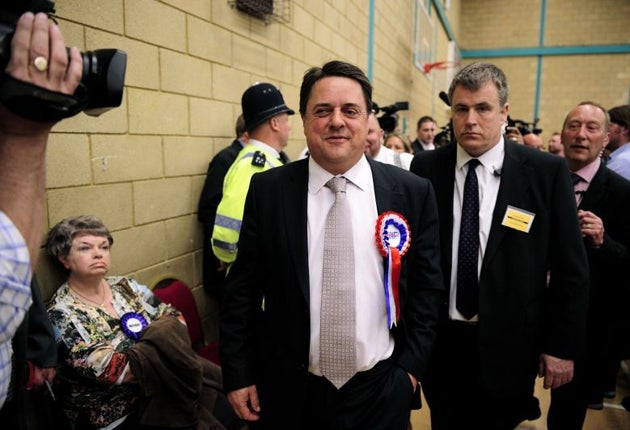Griffin's future in doubt as BNP campaign implodes

Your support helps us to tell the story
From reproductive rights to climate change to Big Tech, The Independent is on the ground when the story is developing. Whether it's investigating the financials of Elon Musk's pro-Trump PAC or producing our latest documentary, 'The A Word', which shines a light on the American women fighting for reproductive rights, we know how important it is to parse out the facts from the messaging.
At such a critical moment in US history, we need reporters on the ground. Your donation allows us to keep sending journalists to speak to both sides of the story.
The Independent is trusted by Americans across the entire political spectrum. And unlike many other quality news outlets, we choose not to lock Americans out of our reporting and analysis with paywalls. We believe quality journalism should be available to everyone, paid for by those who can afford it.
Your support makes all the difference.The British National Party (BNP) failed in its efforts to break into the political mainstream when it suffered a succession of defeats in its key target seats.
The far-right party, led by Nick Griffin, was wiped out in its east London council stronghold of Barking and Dagenham, where its entire complement of 12 councillors lost their seats. In the parliamentary constituency of Barking, Mr Griffin came a poor third. The party had claimed it was on track to win 24 seats on the council, as well as win its first Westminster seat there.
The rout at the hands of the Labour Party, which followed a concerted local campaign by the Hope Not Hate anti-fascist coalition, raised immediate questions about the position of Mr Griffin. In the general election, the extremist group increased its share of the national vote to 1.9 per cent (562,979 votes) but it failed to gain a single MP from 300 candidates. In Stoke South, its other key parliamentary target, its deputy leader, Simon Darby, came in fourth. The party's nationwide tally of 34 councillors also fell – from 34 to 12.
There were calls last night on far-right websites for Mr Griffin to resign after a troubled campaign that started with allegations of a plot by senior members to depose him, and culminated with television footage of one of his most senior lieutenants trading punches with an Asian man in a street brawl.
The BNP leader was pushed into third place in Barking by Margaret Hodge, the tourism minister and Labour incumbent, who doubled her majority to more than 16,000 votes. She told Mr Griffin to "pack your bags and go". The 65-year-old added: "The message of Barking to the BNP is clear: get out and stay out. You are not wanted here and your vile politics have no place in British democracy."
Mr Griffin, however, vowed not to resign, saying: "I would say this to the people of Britain: it is going to be too late for Barking but it is not too late for Britain. Get rid of your masters before they get rid of us."
Labour took control of all 51 seats on Barking and Dagenham council, one of London's most impoverished boroughs, completing a strong performance for the party in the English council elections as it rebuilt its town-hall presence. In 2008, Labour suffered its worst municipal result, coming third behind the Liberal Democrats with a net loss of 331 seats.
In this year's council elections, with 125 out of 164 council polls declared, it had seized back control of eight councils – including Liverpool, St Helens and Doncaster – and won an extra 249 councillors.
The Conservatives lost eight councils and 78 councillors, but overall remained the largest party in local government, with 55 councils to Labour's 25. The Liberal Democrats completed their disappointing election performance with a net loss of two councils, including its flagship local authority Liverpool to Labour for the first time since 1998. Nick Clegg's party, which also lost Sheffield to no overall control, lost 62 councillors. However, the narrowness of the margins of victory in council wards – where seats can often be decided on a difference of a few dozen votes – means that legal challenges are likely over the polling-stations queues that prevented some from voting on Thursday night.
Subscribe to Independent Premium to bookmark this article
Want to bookmark your favourite articles and stories to read or reference later? Start your Independent Premium subscription today.
Join our commenting forum
Join thought-provoking conversations, follow other Independent readers and see their replies
Comments